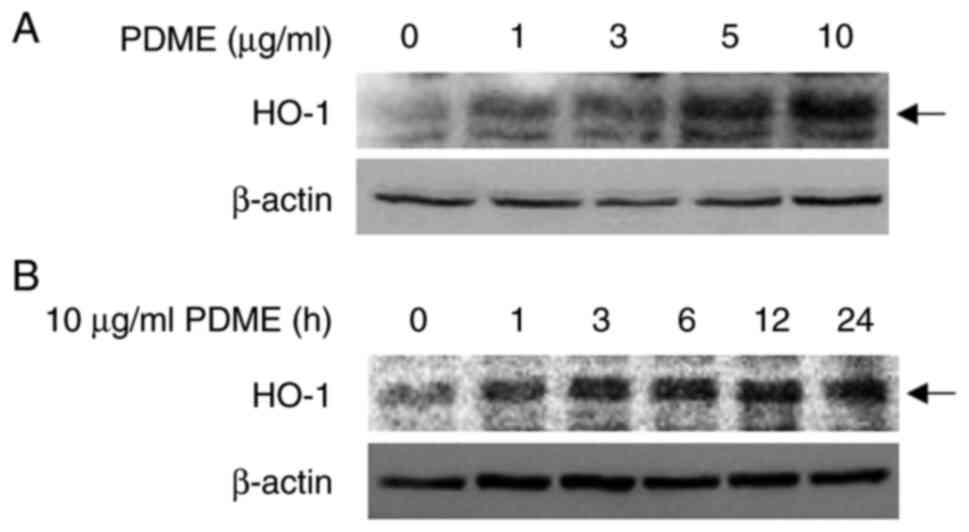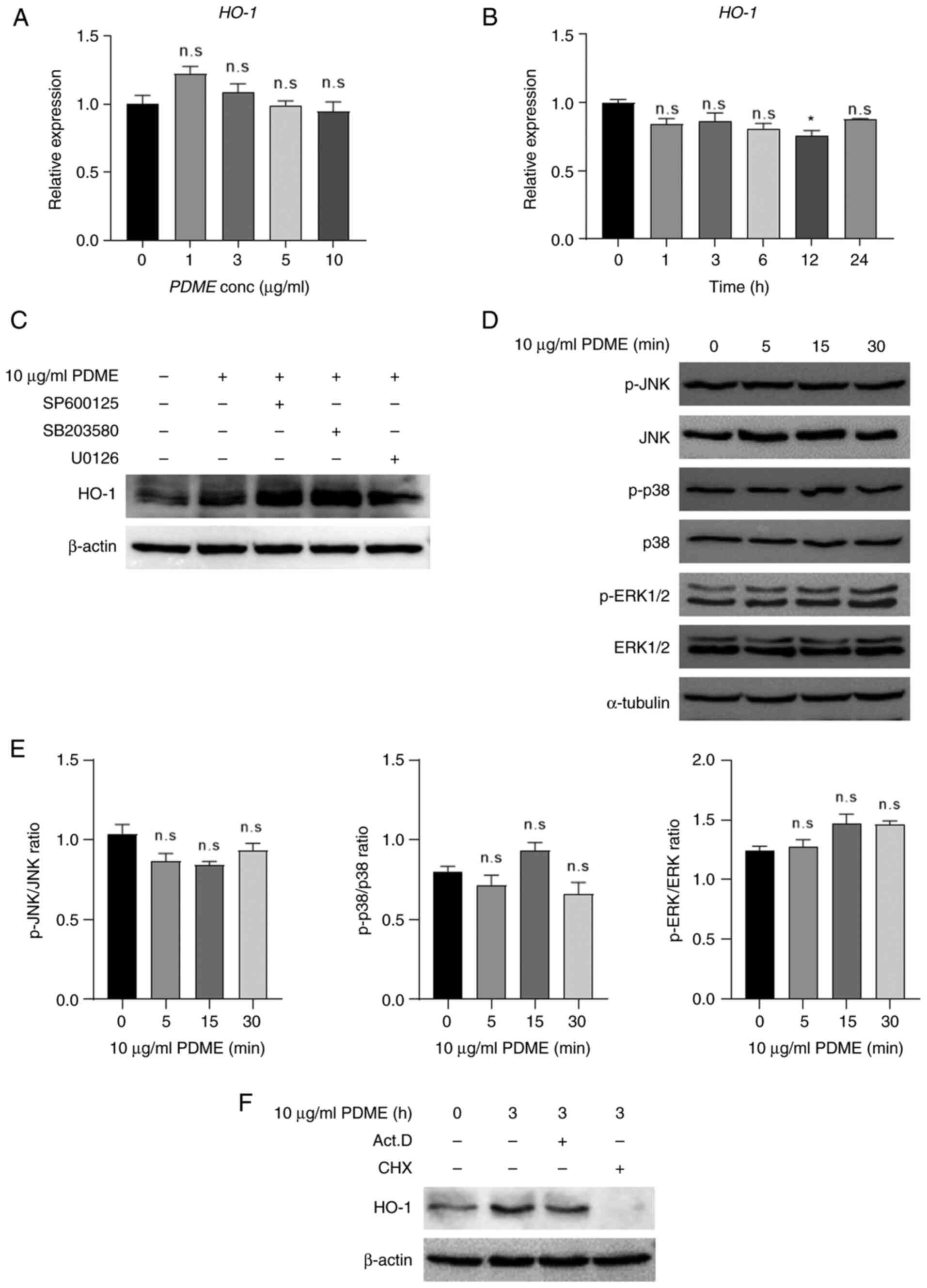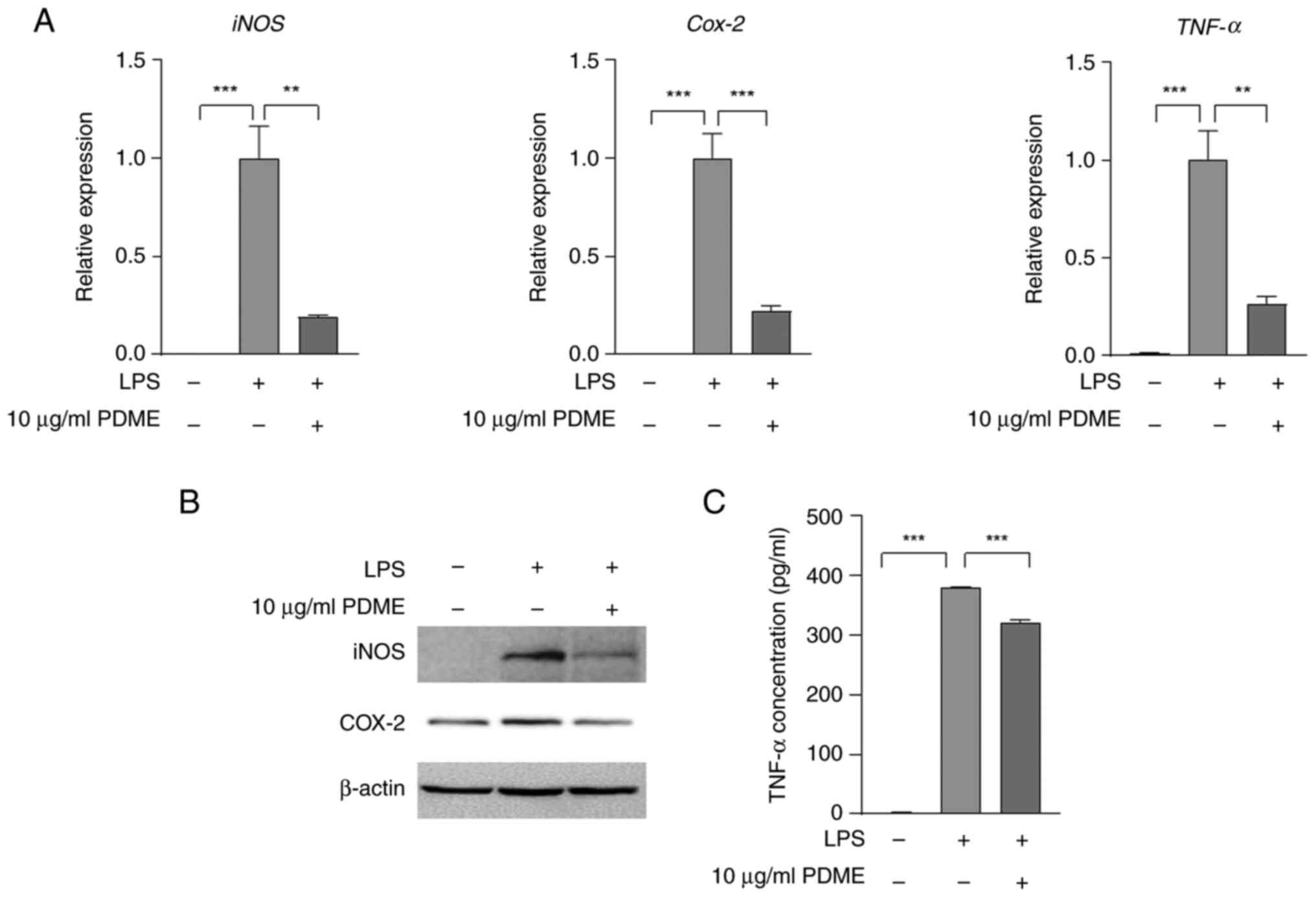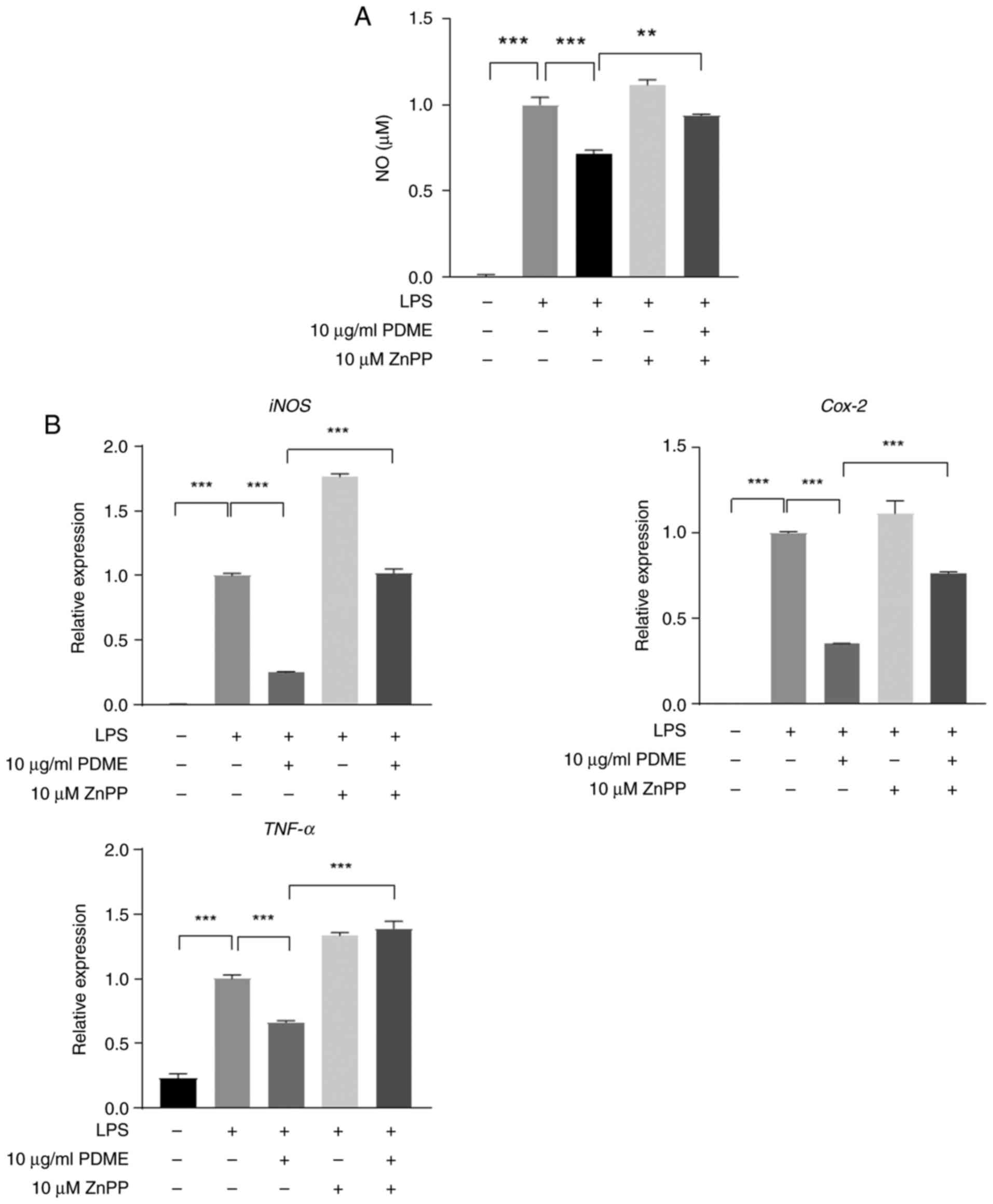|
1
|
Meram C and Wu J: Anti-inflammatory
effects of egg yolk livetins (α, β, and γ-livetin) fraction and its
enzymatic hydrolysates in lipopolysaccharide-induced RAW 264.7
macrophages. Food Res Int. 100:449–459. 2017.PubMed/NCBI View Article : Google Scholar
|
|
2
|
Dewanjee S, Dua TK and Sahu R: Potential
anti-inflammatory effect of Leea macrophylla Roxb. leaves: A wild
edible plant. Food Chem Toxicol. 59:514–520. 2013.PubMed/NCBI View Article : Google Scholar
|
|
3
|
Cooke JP: Inflammation and its role in
regeneration and repair. Circ Res. 124:1166–1168. 2019.PubMed/NCBI View Article : Google Scholar
|
|
4
|
McGlade EA, Miyamoto A and Winuthayanon W:
Progesterone and inflammatory response in the oviduct during
physiological and pathological conditions. Cells.
11(1075)2022.PubMed/NCBI View Article : Google Scholar
|
|
5
|
Chen L, Zhou Y and Dong JX: Chemical
constituents of Peperomia dindygulensis. Zhong Cao Yao. 38:491–493.
2007.(In Chinese).
|
|
6
|
Fujiwara N and Kobayashi K: Macrophages in
inflammation. Curr Drug Targets Inflamm Allergy. 4:281–286.
2005.PubMed/NCBI View Article : Google Scholar
|
|
7
|
Tenhunen R, Marver HS and Schmid R: The
enzymatic conversion of heme to bilirubin by microsomal heme
oxygenase. Proc Natl Acad Sci USA. 61:748–755. 1968.PubMed/NCBI View Article : Google Scholar
|
|
8
|
Campbell NK, Fitzgerald HK and Dunne A:
Regulation of inflammation by the antioxidant haem oxygenase 1. Nat
Rev Immunol. 21:411–425. 2021.PubMed/NCBI View Article : Google Scholar
|
|
9
|
Funes SC, Rios M, Fernández-Fierro A,
Covián C, Bueno SM, Riedel CA, Mackern-Oberti JP and Kalergis AM:
Naturally derived heme-oxygenase 1 inducers and their therapeutic
application to immune-mediated diseases. Front Immunol.
11(1467)2020.PubMed/NCBI View Article : Google Scholar
|
|
10
|
Cruse I and Maines M: Evidence suggesting
that the two forms of heme oxygenase are products of different
genes. J Biol Chem. 263:3348–3353. 1988.PubMed/NCBI
|
|
11
|
Trakshel GM, Kutty RK and Maines MD:
Purification and characterization of the major constitutive form of
testicular heme oxygenase. The noninducible isoform. J Biol Chem.
261:11131–11137. 1986.PubMed/NCBI
|
|
12
|
Ryter SW, Alam J and Choi AM: Heme
oxygenase-1/carbon monoxide: From basic science to therapeutic
applications. Physiol Rev. 86:583–650. 2006.PubMed/NCBI View Article : Google Scholar
|
|
13
|
Choi AM and Alam J: Heme oxygenase-1:
Function, regulation, and implication of a novel stress-inducible
protein in oxidant-induced lung injury. Am J Respir Cell Mol Biol.
15:9–19. 1996.PubMed/NCBI View Article : Google Scholar
|
|
14
|
Alam J, Igarashi K, Immenschuh S,
Shibahara S and Tyrrell RM: Regulation of heme oxygenase-1 gene
transcription: Recent advances and highlights from the
international conference (Uppsala, 2003) on Heme Oxygenase.
Antioxid Redox Signal. 6:924–933. 2004.PubMed/NCBI View Article : Google Scholar
|
|
15
|
Lee TS, Tsai HL and Chau LY: Induction of
heme oxygenase-1 expression in murine macrophages is essential for
the anti-inflammatory effect of low dose 15-deoxy-Delta
12,14-prostaglandin J2. J Biol Chem. 278:19325–19330.
2003.PubMed/NCBI View Article : Google Scholar
|
|
16
|
Wiesel P, Foster LC, Pellacani A, Layne
MD, Hsieh CM, Huggins GS, Strauss P, Yet SF and Perrella MA:
Thioredoxin facilitates the induction of heme oxygenase-1 in
response to inflammatory mediators. J Biol Chem. 275:24840–24846.
2000.PubMed/NCBI View Article : Google Scholar
|
|
17
|
Morse D, Pischke SE, Zhou Z, Davis RJ,
Flavell RA, Loop T, Otterbein SL, Otterbein LE and Choi AM:
Suppression of inflammatory cytokine production by carbon monoxide
involves the JNK pathway and AP-1. J Biol Chem. 278:36993–36998.
2003.PubMed/NCBI View Article : Google Scholar
|
|
18
|
Lee TS and Chau LY: Heme oxygenase-1
mediates the anti-inflammatory effect of interleukin-10 in mice.
Nat Med. 8:240–246. 2002.PubMed/NCBI View Article : Google Scholar
|
|
19
|
Lee JA, Lee MY, Shin IS, Seo CS, Ha H and
Shin HK: Anti-inflammatory effects of Amomum compactum on RAW 264.7
cells via induction of heme oxygenase-1. Arch Pharm Res.
35:739–746. 2012.PubMed/NCBI View Article : Google Scholar
|
|
20
|
Suh GY, Jin Y, Yi AK, Wang XM and Choi AM:
CCAAT/enhancer-binding protein mediates carbon monoxide-induced
suppression of cyclooxygenase-2. Am J Respir Cell Mol Biol.
35:220–226. 2006.PubMed/NCBI View Article : Google Scholar
|
|
21
|
Oh GS, Pae HO, Lee BS, Kim BN, Kim JM, Kim
HR, Jeon SB, Jeon WK, Chae HJ and Chung HT: Hydrogen sulfide
inhibits nitric oxide production and nuclear factor-kappaB via heme
oxygenase-1 expression in RAW264.7 macrophages stimulated with
lipopolysaccharide. Free Radic Biol Med. 41:106–119.
2006.PubMed/NCBI View Article : Google Scholar
|
|
22
|
Li Volti G, Sorrenti V, Murabito P,
Galvano F, Veroux M, Gullo A, Acquaviva R, Stacchiotti A, Bonomini
F, Vanella L and Di Giacomo C: Pharmacological induction of heme
oxygenase-1 inhibits iNOS and oxidative stress in renal
ischemia-reperfusion injury. Transplant Proc. 39:2986–2991.
2007.PubMed/NCBI View Article : Google Scholar
|
|
23
|
Datta PK, Koukouritaki SB, Hopp KA and
Lianos EA: Heme oxygenase-1 induction attenuates inducible nitric
oxide synthase expression and proteinuria in glomerulonephritis. J
Am Soc Nephrol. 10:2540–2550. 1999.PubMed/NCBI View Article : Google Scholar
|
|
24
|
Lee DS, Kim BN, Lim S, Lee J, Kim J, Jeong
JG and Kim S: Effective suppression of nitric oxide production by
HX106N through transcriptional control of heme oxygenase-1. Exp
Biol Med. 240:1136–1146. 2015.PubMed/NCBI View Article : Google Scholar
|
|
25
|
Luo W, Wang Y, Yang H, Dai C, Hong H, Li
J, Liu Z, Guo Z, Chen X, He P, et al: Heme oxygenase-1 ameliorates
oxidative stress-induced endothelial senescence via regulating
endothelial nitric oxide synthase activation and coupling. Aging
(Albany NY). 10:1722–1744. 2018.PubMed/NCBI View Article : Google Scholar
|
|
26
|
Duan Z, Wang Y and Huang X: The Peperomia
dindygulensis: a review of phytochemistry and pharmacology
perspectives. Asian J Tradit Med. 14:193–201. 2019.
|
|
27
|
Wu JL, Li N, Hasegawa T, Sakai J, Mitsui
T, Ogura H, Kataoka T, Oka S, Kiuchi M, Tomida A, et al: Bioactive
secolignans from Peperomia dindygulensis. J Nat Prod. 69:790–794.
2006.PubMed/NCBI View Article : Google Scholar
|
|
28
|
Lin MG, Yu DH, Wang QW, Lu Q, Zhu WJ, Bai
F, Li GX, Wang XW, Yang YF, Qin XM, et al: Secolignans with
antiangiogenic activities from Peperomia dindygulensis. Chem
Biodivers. 8:862–871. 2011.PubMed/NCBI View Article : Google Scholar
|
|
29
|
Wang QW, Yu DH, Lin MG, Zhao M, Zhu WJ, Lu
Q, Li GX, Wang C, Yang YF, Qin XM, et al: Antiangiogenic
polyketides from Peperomia dindygulensis Miq. Molecules.
17:4474–4483. 2012.PubMed/NCBI View Article : Google Scholar
|
|
30
|
Park S, Han HT, Oh SS, Kim DH, Jeong JW,
Lee KW, Kim M, Lim JS, Cho YY, Hwangbo C, et al: NDRG2 sensitizes
myeloid leukemia to arsenic trioxide via GSK3β-NDRG2-PP2A complex
formation. Cells. 8(495)2019.PubMed/NCBI View Article : Google Scholar
|
|
31
|
Choi SC, Kim KD, Kim JT, Oh SS, Yoon SY,
Song EY, Lee HG, Choe YK, Choi I, Lim JS and Kim JW: NDRG2 is one
of novel intrinsic factors for regulation of IL-10 production in
human myeloid cell. Biochem Biophys Res Commun. 396:684–690.
2010.PubMed/NCBI View Article : Google Scholar
|
|
32
|
Livak KJ and Schmittgen TD: Analysis of
relative gene expression data using real-time quantitative PCR and
the 2(-Delta Delta C(T)) method. Methods. 25:402–408.
2001.PubMed/NCBI View Article : Google Scholar
|
|
33
|
Dulak J, Loboda A and Jozkowicz A: Effect
of heme oxygenase-1 on vascular function and disease. Curr Opin
Lipidol. 19:505–512. 2008.PubMed/NCBI View Article : Google Scholar
|
|
34
|
Sun RF, Zhu CC, Yang Y and Yu NJ: Novel
secolignans from peperomia dindygulensis and their inhibitory
activities on JAK-STAT signaling pathways. Fitoterapia. 122:80–84.
2017.PubMed/NCBI View Article : Google Scholar
|
|
35
|
Yan J, Li M, Wang XD, Lu ZY and Ni XL:
Peperomin E (PepE) protects against high fat diet-induced
atherosclerosis in Apolipoprotein E deficient (ApoE(-/-)) mice
through reducing inflammation via the suppression of NLRP3
signaling pathway. Biomed Pharmacother. 105:862–869.
2018.PubMed/NCBI View Article : Google Scholar
|
|
36
|
Beutler B and Rietschel ET: Innate immune
sensing and its roots: The story of endotoxin. Nat Rev Immunol.
3:169–176. 2003.PubMed/NCBI View Article : Google Scholar
|
|
37
|
Medzhitov R and Janeway C Jr: Innate
immune recognition: Mechanisms and pathways. Immunol Rev.
173:89–97. 2000.PubMed/NCBI View Article : Google Scholar
|
|
38
|
Liu S, Yang T, Ming TW, Gaun TKW, Zhou T,
Wang S and Ye B: Isosteroid alkaloids with different chemical
structures from Fritillariae cirrhosae bulbus alleviate LPS-induced
inflammatory response in RAW 264.7 cells by MAPK signaling pathway.
Int Immunopharmacol. 78(106047)2020.PubMed/NCBI View Article : Google Scholar
|
|
39
|
Hu TY, Ju JM, Mo LH, Ma L, Hu WH, You RR,
Chen XQ, Chen YY, Liu ZQ, Qiu SQ, et al: Anti-inflammation action
of xanthones from Swertia chirayita by regulating
COX-2/NF-κB/MAPKs/Akt signaling pathways in RAW 264.7 macrophage
cells. Phytomedicine. 55:214–221. 2019.PubMed/NCBI View Article : Google Scholar
|
|
40
|
Kim Y, Sung J, Sung M, Choi Y, Jeong HS
and Lee J: Involvement of heme oxygenase-1 in the anti-inflammatory
activity of Chrysanthemum boreale Makino extracts on the expression
of inducible nitric oxide synthase in RAW264.7 macrophages. J
Ethnopharmacol. 131:550–554. 2010.PubMed/NCBI View Article : Google Scholar
|
|
41
|
Medina MV, Sapochnik D, Sola MG and Coso
O: Regulation of the expression of heme oxygenase-1: Signal
transduction, gene promoter activation, and beyond. Antioxid Redox
Signal. 32:1033–1044. 2020.PubMed/NCBI View Article : Google Scholar
|
|
42
|
Yang Q and Wang W: The nuclear
translocation of heme oxygenase-1 in human diseases. Front Cell Dev
Biol. 10(890186)2022.PubMed/NCBI View Article : Google Scholar
|
|
43
|
Kietzmann T, Samoylenko A and Immenschuh
S: Transcriptional regulation of heme oxygenase-1 gene expression
by MAP kinases of the JNK and p38 pathways in primary cultures of
rat hepatocytes. J Biol Chem. 278:17927–17936. 2003.PubMed/NCBI View Article : Google Scholar
|
|
44
|
Ohlmann A, Giffhorn-Katz S, Becker I, Katz
N and Immenschuh S: Regulation of heme oxygenase-1 gene expression
by anoxia and reoxygenation in primary rat hepatocyte cultures. Exp
Biol Med (Maywood). 228:584–589. 2003.PubMed/NCBI View Article : Google Scholar
|
|
45
|
Shan Y, Pepe J, Lu TH, Elbirt KK,
Lambrecht RW and Bonkovsky HL: Induction of the heme oxygenase-1
gene by metalloporphyrins. Arch Biochem Biophys. 380:219–227.
2000.PubMed/NCBI View Article : Google Scholar
|
|
46
|
Li X, Huang R, Liu K, Li M, Luo H, Cui L,
Huang L and Luo L: Fucoxanthin attenuates LPS-induced acute lung
injury via inhibition of the TLR4/MyD88 signaling axis. Aging
(Albany NY). 13:2655–2667. 2020.PubMed/NCBI View Article : Google Scholar
|
|
47
|
Lipinski P, Starzynski RR, Drapier JC,
Bouton C, Bartlomiejczyk T, Sochanowicz B, Smuda E, Gajkowska A and
Kruszewski M: Induction of iron regulatory protein 1 RNA-binding
activity by nitric oxide is associated with a concomitant increase
in the labile iron pool: Implications for DNA damage. Biochem
Biophys Res Commun. 327:349–355. 2005.PubMed/NCBI View Article : Google Scholar
|
|
48
|
Bouton C and Demple B: Nitric
oxide-inducible expression of heme oxygenase-1 in human cells.
Translation-independent stabilization of the mRNA and evidence for
direct action of nitric oxide. J Biol Chem. 275:32688–32693.
2000.PubMed/NCBI View Article : Google Scholar
|
|
49
|
Kramer M, Sponholz C, Slaba M, Wissuwa B,
Claus RA, Menzel U, Huse K, Platzer M and Bauer M: Alternative 5'
untranslated regions are involved in expression regulation of human
heme oxygenase-1. PLoS One. 8(e77224)2013.PubMed/NCBI View Article : Google Scholar
|
|
50
|
Lin PH, Chiang MT and Chau LY:
Ubiquitin-proteasome system mediates heme oxygenase-1 degradation
through endoplasmic reticulum-associated degradation pathway.
Biochim Biophys Acta. 1783:1826–1834. 2008.PubMed/NCBI View Article : Google Scholar
|



















